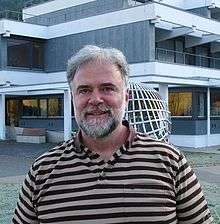András Sebő
| András Sebő | |
|---|---|
 Mathematical Institute Oberwolfach, 2011 | |
| Born |
24 April 1954 Budapest |
| Nationality |
|
| Fields | Mathematics |
| Institutions | CNRS, University of Grenoble |
| Alma mater | Eötvös Loránd University |
| Doctoral advisor | András Frank |
| Doctoral students |
Frank Pfeiffer (1990) W. Schwaerzler (1992) Brahim Chaourar (1993) Karina Marcus (1996) Samia Ould-Ali (2000) Mouna Sadli (2000) Eric Tannier (2002) Vincent Jost (2006) Frederic Meunier (2006) Guyslain Naves (2010) Yohann Benchetrit (2015) |
András Sebő (born 24 April 1954) is a Hungarian-French mathematician working in the areas of combinatorial optimization and discrete mathematics. Sebő is a French National Centre for Scientific Research (CNRS) Director of Research and the head of the Combinatorial Optimization.[1] group in Laboratory G-SCOP,[2] affiliated with the University of Grenoble and the CNRS.
Biography
Sebő received his Ph.D. in 1984 from Eötvös Loránd University and he obtained the Candidate's Degree from the Hungarian Academy of Sciences in 1989, advised by András Frank. From 1979 through 1988, Sebő was a Research Assistant and Research Fellow at The Computer and Automation Research Institute, Hungarian Academy of Sciences in Budapest. He moved to the University of Grenoble in 1988, where he advanced to his current position of CNRS Director of Research. He has held visiting positions at leading mathematical centers, including the Research Institute for Discrete Mathematics in Bonn, Germany (1988-89 as an Alexander von Humboldt Foundation Fellow and 1992-93 as the John von Neumann Professor), DIMACS (1989), University of Waterloo Faculty of Mathematics (multiple years), and the Hausdorff Center for Mathematics (2015). He is also one of seven honorary members of the Egerváry Research Group on Combinatorial Optimization.[3]
Research work
Sebő has advised 11 Doctoral students.[4] In 2012, Sebő and Jens Vygen developed a 7/5-approximation algorithm for the graph version of the traveling salesman problem;[5][6] currently the best-known approximation, improving on the widely-cited 1.5-epislon result of Gharan, Saberi, and Singh.[7] In 2013, Sebő found also an 8/5-approximation algorithm for the path version of the TSP.[8] A scientific conference in honor of Sebő was held April 24–25, 2014 in Grenoble, France.[9]
References
- ↑ "G-SCOP - Optimisation Combinatoire (OC)". G-scop.grenoble-inp.fr. Retrieved 2015-11-02.
- ↑ "G-SCOP - Laboratoire des Sciences pour la Conception, l'Optimisation et la Production de Grenoble - UMR5272". G-scop.grenoble-inp.fr. Retrieved 2015-11-02.
- ↑ "EGRES - Egerváry Research Group on Combinatorial Optimization". Cs.elte.hu. Retrieved 2015-11-02.
- ↑ András Sebő at the Mathematics Genealogy Project
- ↑ "Shorter tours by nicer ears: 7/5-approximation for the graph-TSP, 3/2 for the path version, and 4/3 for two-edge-connected subgraphs". Combinatorica. 2014-07-03. doi:10.1007/s00493-011-2960-3. Retrieved 2015-11-02.
- ↑ Harald Frater. "scinexx | Rekord bei mathematischer Rundreise: Neuer Algorithmus verbessert Annäherung an das Handlungsreisenden-Problem". Scinexx.de. doi:10.1007/s00493-011-2960-3. Retrieved 2015-11-02.
- ↑ "Computer Scientists Find New Shortcuts for Infamous Traveling Salesman Problem". WIRED. 2013-01-30. Retrieved 2015-11-02.
- ↑ "Eight-Fifth Approximation for the Path TSP - Springer". Link.springer.com. 2013-03-18. Retrieved 2015-11-02.
- ↑ "Meeting in honor of Andras Sebo, April 24-25, 2014, Grenoble". Cermics.enpc.fr. 2014-03-20. Retrieved 2015-11-02.
External links
- András Sebő at the Mathematics Genealogy Project
- List of publications from Microsoft Academic Search
- András Sebő at DBLP Bibliography Server
- András Sebő's publications indexed by the Scopus bibliographic database, a service provided by Elsevier. (subscription required)